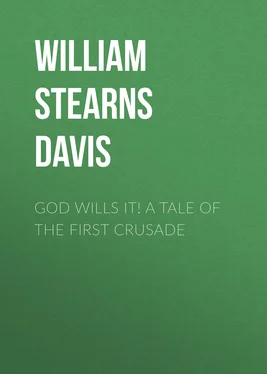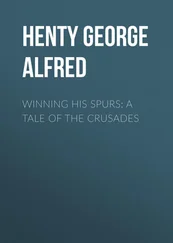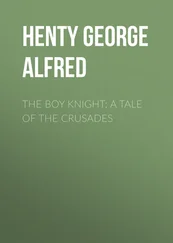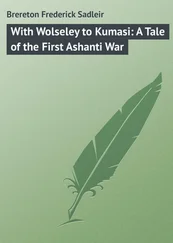William Stearns Davis - God Wills It! A Tale of the First Crusade
Здесь есть возможность читать онлайн «William Stearns Davis - God Wills It! A Tale of the First Crusade» — ознакомительный отрывок электронной книги совершенно бесплатно, а после прочтения отрывка купить полную версию. В некоторых случаях можно слушать аудио, скачать через торрент в формате fb2 и присутствует краткое содержание. Жанр: foreign_prose, foreign_antique, на английском языке. Описание произведения, (предисловие) а так же отзывы посетителей доступны на портале библиотеки ЛибКат.
- Название:God Wills It! A Tale of the First Crusade
- Автор:
- Жанр:
- Год:неизвестен
- ISBN:нет данных
- Рейтинг книги:4 / 5. Голосов: 1
-
Избранное:Добавить в избранное
- Отзывы:
-
Ваша оценка:
- 80
- 1
- 2
- 3
- 4
- 5
God Wills It! A Tale of the First Crusade: краткое содержание, описание и аннотация
Предлагаем к чтению аннотацию, описание, краткое содержание или предисловие (зависит от того, что написал сам автор книги «God Wills It! A Tale of the First Crusade»). Если вы не нашли необходимую информацию о книге — напишите в комментариях, мы постараемся отыскать её.
God Wills It! A Tale of the First Crusade — читать онлайн ознакомительный отрывок
Ниже представлен текст книги, разбитый по страницам. Система сохранения места последней прочитанной страницы, позволяет с удобством читать онлайн бесплатно книгу «God Wills It! A Tale of the First Crusade», без необходимости каждый раз заново искать на чём Вы остановились. Поставьте закладку, и сможете в любой момент перейти на страницу, на которой закончили чтение.
Интервал:
Закладка:
"So," asked Richard, "this raid was on your account?"
"Of course," replied Musa; "I was surprised at the country house of Hajib this morning, and taken before I could kill more than two of the pirates. In their chief I recognized a corsair long in the service of Yusuf. They aimed to bear me in chains to Cordova, that the Almoravide might gloat over me alive, ere calling the headsman. You saw how they rained their blows at me, when they saw rescue at hand."
"The saints be praised, I saved you!" exclaimed the Norman. "You were indeed in the very jaws of death."
"Aye," was the careless answer, "and I owe you all thanks; yet this is not the first time I have imagined I would see no more mornings."
"Ah, my lord, you are a great cavalier!" cried Richard, enthusiastically.
The Spaniard shook his hand in warning.
"I am not 'lord' to you, brother! If Allah favors our friendship, what brave adventures shall we not have together!"
Longsword made no reply. The Moor had captivated him: he felt that he could ride through a thousand men-at-arms with such a friend at his side. Presently they drew rein under a wide-spreading, venerable chestnut tree that bowed over the highway. Here were gathered the Baron and most of his men: here was my lord bishop sitting on the ground upon a saddle, still groaning and rubbing his bruised shins, while two scared priests were shivering beside him, and muttering a gratias Deo for their deliverance from the infidel. The old Greek was also there, resting on a saddle-bag; but when the young Norman galloped up he made shift to rise; and his daughter, who had already left her pillion, hastened to say:—
"This, my father, is that brave Frankish nobleman to whom we owe so much," and then to Longsword: "And this is my father, the Cæsar Manuel Kurkuas, late of Constantinople, but who now is exile, and travelling to Palermo."
The old Kurkuas, despite his lameness, bowed in the stately fashion of that ceremonious courtesy which was his inheritance.
"Lord Richard," said he, in his sonorous native tongue, for he already knew the Norman's name, "the blessings of a father be yours; and if at any time, by word or deed, I may repay you, your wish shall be my highest law."
But the daughter broke out, a little hotly:—
"Oh! father, not in so solemn and courtly a manner thank him! We are not in 'His Divine Majesty's' palace, by the Golden Horn. Take him by the hand as I have done; tell him that we are his friends forever, and that if we go back to Constantinople, we will take him with us, and share with him all the riches and honor that would belong to a real Kurkuas."
The old man listened to her flow of eager words, half pleased, half alarmed; then, with a deprecatory shrug, exclaimed:—
"Pardon a thousand times, my lord, if I am too old to speak all that lies at heart, save in a cold and formal way. Yet pardon, also, my daughter; for she has so unbridled a tongue that if you come to know her, strong must your friendship be, or she will drive you from her by sheer witless chatter."
Whereupon, before Richard could reply, the lady returned to the charge. "Yes, truly, I am half of Frankish blood myself. And I think it better to speak from my heart and declare 'I love you' and 'I hate you,' than to move my lips softly and politely and say things that mean nothing."
The Greek shrugged again, as if accustomed to such outbursts. "You have lost your veil," he said gently, raising his eyes.
"Assuredly," was the answer; "nor do Frankish ladies wear them." Then, turning to Richard, "Tell me, Sir Norman, do you see anything about me to be ashamed of, that I must veil my face?"
The remark was advanced so naturally, in such perfectly good faith, that Longsword, without the least premeditation, answered as readily as if to his sister:—
"I see no reason why you should veil, my lady."
"Then do not speak of it again, dear father," said she.
The mules of the bishop's party, which had been taken when the pirates fell upon them, had been recovered, and the bishop began to stop groaning over his bruises. The Baron remarked that, although the baggage had been retaken, it was too late to repack and make the journey that day. One and all, they must go back to Cefalu and enjoy the hospitality of the castle. The bishop demurred, when he saw that the Moslem Musa was bidden to share the feast; but he was very hungry, and reflected that Christ and Mohammed were impiously good comrades in Sicily. He and the priests with the Greek and his daughter mounted the mules and started away, just as Herbert rode up with the tidings that the Berbers' ship had long since put to sea. As for the great black horse that had nigh carried Mary away from her rescuers, the grateful prelate bestowed him upon Richard. "He was an unruly beast," declared the bishop, " furiosus, impetuosus, perditus equus , in whom a devil beyond all doubt had entered; and if the Baron's son desired him, he was welcome, though he feared, instead of a gift, he was bestowing a cursing." But Richard beheld the huge crupper and chest of the great beast, watched his mighty stride, and reflected that such a destrer would bear quite as safely in battle as one with the prized white coat and greyhound feet. Therefore he thanked the bishop and led the horse away.
So they fared back to the castle, while the Cefalu people gave them cheers and flowers as they passed along the way; but the fairest welcome was on Lady Margaret's face when they all pounded over the drawbridge.
CHAPTER III
HOW RICHARD WON A BROTHER
A notable feast it was the good Lady Margaret set before her unexpected guests; for if the warning was short, the eager hands were many, and the day before there had been rare hunting. The worthy Baron, her lord, took pride in the goodly Norman habit of sitting long at table, and would have found eight hours none too many for meat and drink, had there been another to keep him company. And if this feast ended sooner, there was no lack of good food and better cheer. Hincmar, the stately chamberlain, marshalled his guests up to the fountain at the door of the great hall, where they washed their hands in punctilious order of precedence. The hall itself was hung with rare tapestries, the floor was strewn with fresh mint and cornflags; over the diners' benches were cast rich carpets of the East, and for the host and his immediate relatives and guests were gilt chairs of embossed leather. Then the serving-lads went in and out, bringing wine-soup in three kinds in remembrance of the Trinity, and flesh and fowl, from a stuffed cormorant to a haunch of bear's flesh. Last of all the great drinking-horns began to pass to and fro, and the skins of Cyprian wine from the cellars, to empty.
The Baron had placed the bishop at his right hand at the head of the long table, on his left the Greek Cæsar. But a little lower sat Richard, and beside him Musa and Mary Kurkuas; and while they were busy over the trenchers talk flew fast, and these in brief were the stories they told one another.
William Longsword, the present Baron of Cefalu, had been a Norman seigneur of noble lineage and slender estates near the ducal capital of Rouen. The Longswords were an ancient house. They boasted their descent from that notable William Longsword who had succeeded to the sovereignty of Rollo the Norman; yet, as too often, a great name did not mean great fiefs, and young William's best fortune was the weight of his battle-axe. But that battle-axe was very heavy. At Val-es-Dunes, when William the Bastard crushed his rebellious barons, Longsword had won the great Duke's highest favor. At Hastings none had struck doughtier blows than he. For a moment he had dreamt of a broad English barony and a Saxon heiress. But when the new king was at York there rose ill-blood and a hint to the monarch that the mutiny of certain Anjou mercenaries was due to his vassal.
Читать дальшеИнтервал:
Закладка:
Похожие книги на «God Wills It! A Tale of the First Crusade»
Представляем Вашему вниманию похожие книги на «God Wills It! A Tale of the First Crusade» списком для выбора. Мы отобрали схожую по названию и смыслу литературу в надежде предоставить читателям больше вариантов отыскать новые, интересные, ещё непрочитанные произведения.
Обсуждение, отзывы о книге «God Wills It! A Tale of the First Crusade» и просто собственные мнения читателей. Оставьте ваши комментарии, напишите, что Вы думаете о произведении, его смысле или главных героях. Укажите что конкретно понравилось, а что нет, и почему Вы так считаете.












